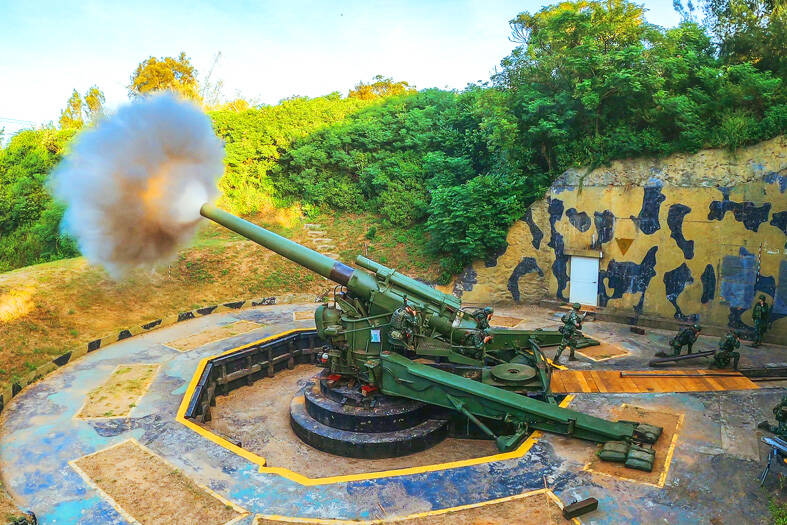The Executive Yuan plans to propose a national defense budget of about NT$630 billion (US$19.18 billion) for the next fiscal year, which is about 5 percent higher than this year, an official familiar with the issue said yesterday.
Despite the unprecedented increase in the budget, it still accounts for less than 3 percent of the nation’s GDP.
After Premier Cho Jung-tai (卓榮泰) held an annual projects and budgets review meeting for the 2025 fiscal year on Sunday, local media reported that the total annual budget expenditure is to be nearly NT$3 trillion and total annual budget revenues about NT$2.8 trillion.

Photo courtesy of the Ministry of National Defense
The national defense budget is said to be about NT$460 billion, and with special budgets and special funds, it would total about NT$630 billion.
The total budget has not yet been finalized and the principle is “to make both ends meet,” so if total annual budget expenditure exceeds NT$3 trillion, total annual budget revenues would not be far from it, the official said.
The government does not wish to have excessive debt, so projected expenditures would be adjusted after carefully considering expected revenues, they said.
The budgets are scheduled to be further discussed and approved at a meeting of the Executive Yuan in the middle of next month, so there would be more concrete and detailed plans by then, they added.
The Executive Yuan on Sunday said the compilation of the central government general budget for the 2025 fiscal year would follow the new government’s administrative policies, and ministries would draft policies and projects and allocate budgets accordingly.
The budgetary compilation would also proceed under the premise of fiscal discipline and taking into account moderate growth of expenditures and revenues, it said.
The Executive Yuan also said that not including the special budget for the Forward-looking Infrastructure Development Program, the budget for improving public infrastructure would see the highest increase, and that hopefully it would improve road traffic and pedestrian safety, and increase the adoption of electric vehicles.
Meanwhile, there would also be increased expenditure on science and technology development, grants from the central government to local governments and social welfare programs, it said.

SECURITY: As China is ‘reshaping’ Hong Kong’s population, Taiwan must raise the eligibility threshold for applications from Hong Kongers, Chiu Chui-cheng said When Hong Kong and Macau citizens apply for residency in Taiwan, it would be under a new category that includes a “national security observation period,” Mainland Affairs Council (MAC) Minister Chiu Chui-cheng (邱垂正) said yesterday. President William Lai (賴清德) on March 13 announced 17 strategies to counter China’s aggression toward Taiwan, including incorporating national security considerations into the review process for residency applications from Hong Kong and Macau citizens. The situation in Hong Kong is constantly changing, Chiu said to media yesterday on the sidelines of the Taipei Technology Run hosted by the Taipei Neihu Technology Park Development Association. With

CARROT AND STICK: While unrelenting in its military threats, China attracted nearly 40,000 Taiwanese to over 400 business events last year Nearly 40,000 Taiwanese last year joined industry events in China, such as conferences and trade fairs, supported by the Chinese government, a study showed yesterday, as Beijing ramps up a charm offensive toward Taipei alongside military pressure. China has long taken a carrot-and-stick approach to Taiwan, threatening it with the prospect of military action while reaching out to those it believes are amenable to Beijing’s point of view. Taiwanese security officials are wary of what they see as Beijing’s influence campaigns to sway public opinion after Taipei and Beijing gradually resumed travel links halted by the COVID-19 pandemic, but the scale of

A US Marine Corps regiment equipped with Naval Strike Missiles (NSM) is set to participate in the upcoming Balikatan 25 exercise in the Luzon Strait, marking the system’s first-ever deployment in the Philippines. US and Philippine officials have separately confirmed that the Navy Marine Expeditionary Ship Interdiction System (NMESIS) — the mobile launch platform for the Naval Strike Missile — would take part in the joint exercise. The missiles are being deployed to “a strategic first island chain chokepoint” in the waters between Taiwan proper and the Philippines, US-based Naval News reported. “The Luzon Strait and Bashi Channel represent a critical access

Pope Francis is be laid to rest on Saturday after lying in state for three days in St Peter’s Basilica, where the faithful are expected to flock to pay their respects to history’s first Latin American pontiff. The cardinals met yesterday in the Vatican’s synod hall to chart the next steps before a conclave begins to choose Francis’ successor, as condolences poured in from around the world. According to current norms, the conclave must begin between May 5 and 10. The cardinals set the funeral for Saturday at 10am in St Peter’s Square, to be celebrated by the dean of the College